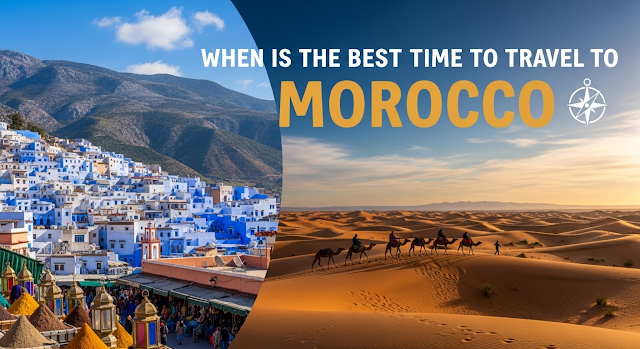When Is the Best Time to Visit Morocco?
Planning a trip to Morocco? You’re in for an incredible experience! This North African country is a treasure trove of vibrant culture, stunning landscapes, and rich history. But when is the best time to visit Morocco? The answer depends on your preferences—whether you’re seeking pleasant weather, fewer crowds, or unique cultural events. In this guide, we’ll dive into Morocco’s climate, tourist seasons, and special festivals to help you pick the perfect time for your Morocco travel adventure.
Understanding Morocco’s Diverse Climate
Morocco’s weather varies widely depending on where you go, thanks to its diverse geography. From coastal cities to desert dunes and towering mountains, the Morocco weather plays a big role in determining the best time to visit.
Coastal Regions
Cities like Casablanca and Essaouira enjoy a Mediterranean climate. Summers (June to August) are warm and dry, with temperatures averaging 20-25°C (68-77°F), while winters (December to February) are mild and wet, hovering between 15-20°C (59-68°F). Rain is more common from November to March, so pack an umbrella if you’re visiting the coast during this time.
Inland Cities
Inland hubs like Marrakech and Fes have a semi-arid climate. Summers can be scorching, with temperatures climbing above 38°C (100°F), while winters are milder, with nighttime lows around 5°C (41°F). Spring and autumn offer a comfortable middle ground, making them popular times for Morocco travel.
Atlas Mountains
The Atlas Mountains are cooler year-round. In winter, temperatures can drop below freezing, and snow blankets the peaks—perfect for skiing or snowboarding. For hiking, spring (March to May) and autumn (September to November) provide milder conditions.
Sahara Desert
The Sahara is a land of extremes. Summer temperatures can hit 45°C (113°F), making daytime exploration challenging. Nights, however, can be chilly even in summer. For a desert adventure, spring or autumn are ideal, with more tolerable heat and cooler evenings.
Navigating Morocco’s Tourist Seasons
When planning your trip, understanding Morocco’s tourist seasons can help you balance weather, crowds, and costs. Here’s a breakdown to guide your Morocco travel decision.
Peak Seasons: Spring and Autumn
Spring (March to May) and autumn (September to November) are Morocco’s peak tourist seasons—and for good reason. The Morocco weather is mild and pleasant, ideal for sightseeing, hiking, or desert camping. Temperatures range from 20-30°C (68-86°F) in most areas, though the mountains stay cooler.
However, these seasons draw big crowds. Popular spots like Marrakech’s medinas or the Sahara’s Erg Chebbi dunes can feel busy, and prices for accommodations and tours often rise. Booking early is a smart move if you’re eyeing these times.
Off-Peak Season: Winter
Winter (December to February) is quieter, offering a chance to enjoy Morocco with fewer tourists. Coastal areas see rain, and the Atlas Mountains get cold and snowy, but inland cities like Marrakech remain mild. This is a great time for budget travelers, as prices drop and crowds thin out. Just pack layers for the cooler nights!
Low Season: Summer
Summer (June to August) is Morocco’s low season due to the intense heat, especially inland and in the desert. If you don’t mind temperatures above 38°C (100°F), this can be a budget-friendly time to visit. The coast, like Agadir or Essaouira, stays cooler, making it a haven for beach lovers. Crowds are smaller, and deals are easier to find.
Experiencing Morocco’s Festivals and Events
One of the best ways to enhance your Morocco travel experience is by timing your visit with a cultural event. Morocco festivals offer a window into the country’s traditions and energy. Here are some highlights:
Rose Festival (May)
Held in the Dades Valley, the Rose Festival celebrates the harvest of Damask roses. Expect music, dance, and local crafts. It’s a fragrant and colorful event, perfect for spring travelers.
Gnaoua Music Festival (June)
Every June, Essaouira hosts the Gnaoua Music Festival, blending traditional Gnawa music with international artists. It’s a lively celebration by the sea, though summer heat is starting to kick in.
Fes Festival of World Sacred Music (June)
This renowned festival in Fes brings together spiritual music from around the globe. Held in early summer, it’s a cultural gem for music lovers.
Marrakech International Film Festival (November)
In late autumn, Marrakech lights up with this star-studded event. It’s a great excuse to visit during the mild November weather.
Travel Tip: Festivals can spike demand for hotels and raise prices. If you’re planning to attend one, book accommodations well in advance. Check official sites like Visit Morocco for exact dates.
Choosing the Best Time for Your Morocco Trip
So, when is the best time to visit Morocco? It depends on what you value most. Here’s a quick recap:
-
For Pleasant Weather: Spring (March to May) and autumn (September to November) offer mild temperatures and sunny days, perfect for exploring cities, mountains, or deserts.
-
For Budget and Fewer Crowds: Winter (December to February) brings lower prices and a quieter experience, though you’ll need to prepare for cooler or wetter conditions.
-
For Beach Vibes: Summer (June to August) suits coastal visits, with moderate temperatures and fewer tourists—ideal if you can handle the inland heat.
-
For Cultural Immersion: Align your trip with a festival like the Rose Festival or Gnaoua Music Festival for a deeper dive into Moroccan culture.
Final Tips for Planning Your Morocco Adventure
No matter when you go, a little planning goes a long way. Here are some extras to consider:
-
Packing: Layers are key—Morocco’s weather can shift dramatically between day and night or region to region.
-
Crowds: Avoid peak holiday periods like Easter or Christmas if you prefer a calmer trip.
-
Resources: For more inspiration, check out Morocco’s Official Tourism Site or connect with a travel expert.
Ready to plan your Morocco travel adventure? Whether you’re dreaming of bustling souks, mountain treks, or desert sunsets, picking the best time to visit Morocco can make your trip unforgettable. Need personalized advice? Reach out to a travel pro at Fora Travel today!


